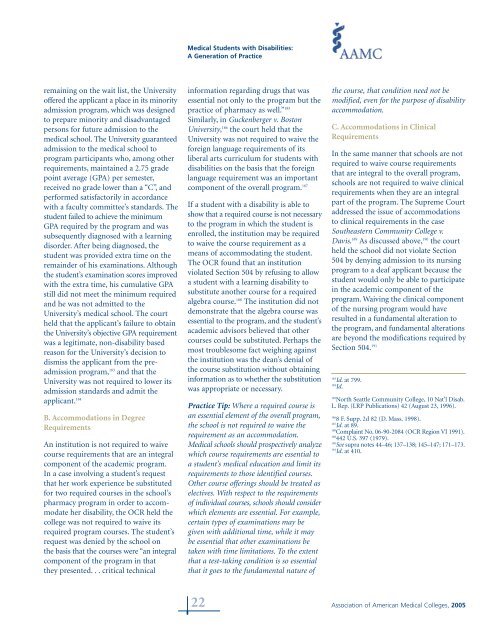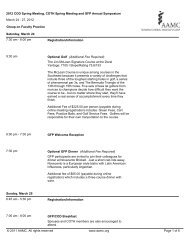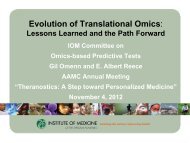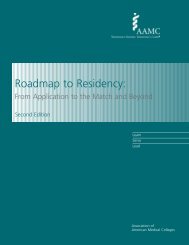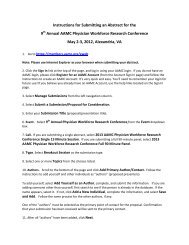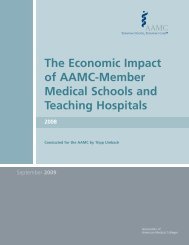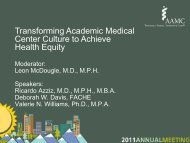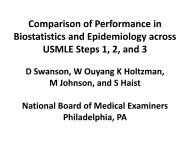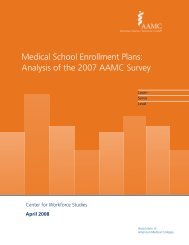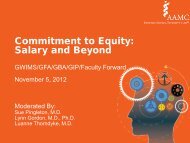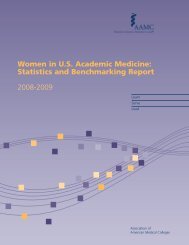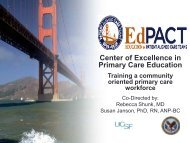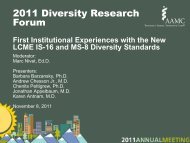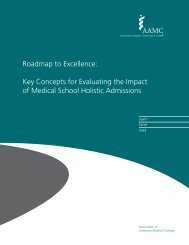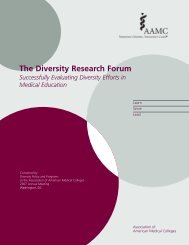Medical Students with Disabilities: A Generation of Practice
Medical Students with Disabilities: A Generation of Practice
Medical Students with Disabilities: A Generation of Practice
Create successful ePaper yourself
Turn your PDF publications into a flip-book with our unique Google optimized e-Paper software.
<strong>Medical</strong> <strong>Students</strong> <strong>with</strong> <strong>Disabilities</strong>:<br />
A <strong>Generation</strong> <strong>of</strong> <strong>Practice</strong><br />
remaining on the wait list, the University<br />
<strong>of</strong>fered the applicant a place in its minority<br />
admission program, which was designed<br />
to prepare minority and disadvantaged<br />
persons for future admission to the<br />
medical school. The University guaranteed<br />
admission to the medical school to<br />
program participants who, among other<br />
requirements, maintained a 2.75 grade<br />
point average (GPA) per semester,<br />
received no grade lower than a “C”, and<br />
performed satisfactorily in accordance<br />
<strong>with</strong> a faculty committee’s standards. The<br />
student failed to achieve the minimum<br />
GPA required by the program and was<br />
subsequently diagnosed <strong>with</strong> a learning<br />
disorder. After being diagnosed, the<br />
student was provided extra time on the<br />
remainder <strong>of</strong> his examinations. Although<br />
the student’s examination scores improved<br />
<strong>with</strong> the extra time, his cumulative GPA<br />
still did not meet the minimum required<br />
and he was not admitted to the<br />
University’s medical school. The court<br />
held that the applicant’s failure to obtain<br />
the University’s objective GPA requirement<br />
was a legitimate, non-disability based<br />
reason for the University’s decision to<br />
dismiss the applicant from the preadmission<br />
program, 183 and that the<br />
University was not required to lower its<br />
admission standards and admit the<br />
applicant. 184<br />
B. Accommodations in Degree<br />
Requirements<br />
An institution is not required to waive<br />
course requirements that are an integral<br />
component <strong>of</strong> the academic program.<br />
In a case involving a student’s request<br />
that her work experience be substituted<br />
for two required courses in the school’s<br />
pharmacy program in order to accommodate<br />
her disability, the OCR held the<br />
college was not required to waive its<br />
required program courses. The student’s<br />
request was denied by the school on<br />
the basis that the courses were “an integral<br />
component <strong>of</strong> the program in that<br />
they presented. . . critical technical<br />
information regarding drugs that was<br />
essential not only to the program but the<br />
practice <strong>of</strong> pharmacy as well.” 185<br />
Similarly, in Guckenberger v. Boston<br />
University, 186 the court held that the<br />
University was not required to waive the<br />
foreign language requirements <strong>of</strong> its<br />
liberal arts curriculum for students <strong>with</strong><br />
disabilities on the basis that the foreign<br />
language requirement was an important<br />
component <strong>of</strong> the overall program. 187<br />
If a student <strong>with</strong> a disability is able to<br />
show that a required course is not necessary<br />
to the program in which the student is<br />
enrolled, the institution may be required<br />
to waive the course requirement as a<br />
means <strong>of</strong> accommodating the student.<br />
The OCR found that an institution<br />
violated Section 504 by refusing to allow<br />
a student <strong>with</strong> a learning disability to<br />
substitute another course for a required<br />
algebra course. 188 The institution did not<br />
demonstrate that the algebra course was<br />
essential to the program, and the student’s<br />
academic advisors believed that other<br />
courses could be substituted. Perhaps the<br />
most troublesome fact weighing against<br />
the institution was the dean’s denial <strong>of</strong><br />
the course substitution <strong>with</strong>out obtaining<br />
information as to whether the substitution<br />
was appropriate or necessary.<br />
<strong>Practice</strong> Tip: Where a required course is<br />
an essential element <strong>of</strong> the overall program,<br />
the school is not required to waive the<br />
requirement as an accommodation.<br />
<strong>Medical</strong> schools should prospectively analyze<br />
which course requirements are essential to<br />
a student’s medical education and limit its<br />
requirements to those identified courses.<br />
Other course <strong>of</strong>ferings should be treated as<br />
electives. With respect to the requirements<br />
<strong>of</strong> individual courses, schools should consider<br />
which elements are essential. For example,<br />
certain types <strong>of</strong> examinations may be<br />
given <strong>with</strong> additional time, while it may<br />
be essential that other examinations be<br />
taken <strong>with</strong> time limitations. To the extent<br />
that a test-taking condition is so essential<br />
that it goes to the fundamental nature <strong>of</strong><br />
the course, that condition need not be<br />
modified, even for the purpose <strong>of</strong> disability<br />
accommodation.<br />
C. Accommodations in Clinical<br />
Requirements<br />
In the same manner that schools are not<br />
required to waive course requirements<br />
that are integral to the overall program,<br />
schools are not required to waive clinical<br />
requirements when they are an integral<br />
part <strong>of</strong> the program. The Supreme Court<br />
addressed the issue <strong>of</strong> accommodations<br />
to clinical requirements in the case<br />
Southeastern Community College v.<br />
Davis. 189 As discussed above, 190 the court<br />
held the school did not violate Section<br />
504 by denying admission to its nursing<br />
program to a deaf applicant because the<br />
student would only be able to participate<br />
in the academic component <strong>of</strong> the<br />
program. Waiving the clinical component<br />
<strong>of</strong> the nursing program would have<br />
resulted in a fundamental alteration to<br />
the program, and fundamental alterations<br />
are beyond the modifications required by<br />
Section 504. 191<br />
183<br />
Id. at 799.<br />
184<br />
Id.<br />
185<br />
North Seattle Community College, 10 Nat’l Disab.<br />
L. Rep. (LRP Publications) 42 (August 23, 1996).<br />
186<br />
8 F. Supp. 2d 82 (D. Mass. 1998).<br />
187<br />
Id. at 89.<br />
188<br />
Complaint No. 06-90-2084 (OCR Region VI 1991).<br />
189<br />
442 U.S. 397 (1979).<br />
190<br />
See supra notes 44–46; 137–138; 145–147; 171–173.<br />
191<br />
Id. at 410.<br />
22 Association <strong>of</strong> American <strong>Medical</strong> Colleges, 2005


